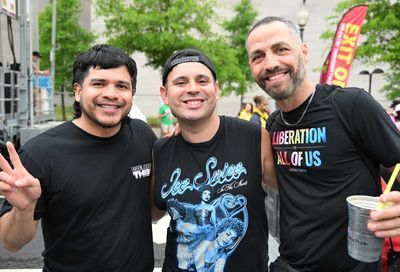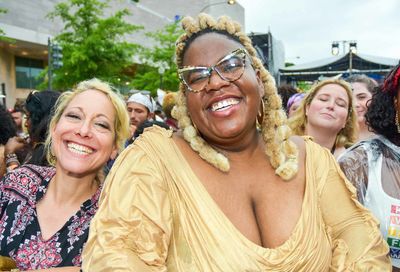D.C. City Councilmember David Catania (I-At large) continued his probe into management decisions of Whitman-Walker Clinic under the leadership of Donald Blanchon, on Monday, April 27, during the Committee on Health‘s second ”public oversight roundtable” on the matter.
”I believe this clinic is losing its intended focus, its intended mission, for the LGBT community,” said Catania, who is gay and chairs the committee. The first roundtable discussion, following a round of layoffs, was Jan. 28. ”I believe the current leadership has mismanaged to a substantial degree this clinic, and I think evidence today is going to demonstrate that.”
Blanchon was at the roundtable representing the clinic, along the clinic’s new board chair June Crenshaw, though public comments were largely limited to those critical of clinic management.
Crenshaw, a lesbian and an IT project manager for a healthcare organization in Bethesda, as well as a board member since 2007 prior to becoming chair, opened by addressing the April 23 resignation of the clinic’s former board chair James ”Jim” Sandman. It was a topic of particular importance because on Tuesday, March 24, in an attempt to address Catania’s concerns, WWC announced that the law firm Arnold & Porter LLP had found no substantial mismanagement of the clinic after a pro bono independent review of the clinic.
But in recent weeks it came to light that Sandman was a former partner of that law firm. On Monday, Crenshaw asserted that Sandman did not resign from the board because of his involvement with the law firm.
”Mr. Sandman determined that he personally could not represent the clinic as a witness because of his current position as a D.C. government employee, and he resigned,” she explained. Crenshaw concluded her statement by saying, ”Whitman-Walker Clinic is on the front lines of the battle against HIV and AIDS in D.C. Our work is too important, our care for patients is too vital, to be diverted by a personal vendetta. Mr. Catania, enough is enough.”
Catania countered that his criticism of Blanchon’s leadership of the clinic does not equate to criticism of the clinic itself.
”Mr. Blanchon is not the clinic, far from it,” Catania said. “That’s difficult for me to comprehend, that on the one hand I’ve been the single biggest financial benefactor of this clinic, and I would seek to destroy it. It makes no sense.”
Catania pointed out that during the past three and a half years that he has chaired the Committee on Health, he has collected more than $6 million in government funding for the clinic, which was founded by community members in 1973 as a gay men’s STD clinic.
”The fact is there are very serious concerns and very real problems this clinic is facing. Among other things, losing its LGBT focus, and more substantiallyÂ… how is it that under the leadership of the current executive director the revenue of this clinic has fallen by 44 percent, or that private giving has fallen by 56 percent. These are not inconsequential items, these are substantial items.”
Barbara Chinn and Dr. Patricia Hawkins, who each worked at the clinic for about 20 years before being laid off in December without severance, in accordance with their contracts, attended Monday’s roundtable and addressed the committee.
The eight people offering public comment at Monday’s meeting presented a range of issues, from negligence to discrimination. Among them was Robert Benish, who took issue with clinic management’s fundraising priorities.
Benish, the clinic’s director of annual giving since 2003, said his program used to generate between $3-3.5 million before the clinic’s current management took over.
”Fundraising has never been a priority with this management team,” he said. Benish claims an example of how ”fundraising does not even hit the current management’s radar screen,” is that management spent thousands of dollars on postage to mail letters to donors asking them to write Catania and urge him to leave the clinic’s management alone.
”They know how to cut services, cut employees, shut down facilities, but generating and collecting revenue seems to elude them,” Benish said.
As one of those cut employees, and speaking directly to one of Catania’s complaints, Hawkins told the roundtable that during the last three years, most of the clinic’s GLBT-specific programs had been cut.
”I fear that without a clear and primary LGBT focus, the clinic will soon vanish and be but a fading memory of what once was,” she said.
Mary Murray, who managed the volunteer program at WWC from May 2005 until December 2008, said, ”There is a climate of fear at the clinic.
”Don made it clear, from early on, that anyone who disagreed with him did not have a future at the clinic,” she said. She went on to describe Blanchon as ”out of the loop,” saying that during the January roundtable he told the committee that the clinic has about 800 active volunteers, while she said that number is closer to 150.
During the roundtable meeting, Blanchon and Crenshaw asked why they were not allowed to present witnesses to speak on behalf of clinic management, to which Catania countered that such witnesses were allowed during the initial roundtable, reserving the second meeting for those critical of clinic management.
Catania also said he plans to meet with Crenshaw to ensure her commitment to the clinic, and that he will continue the public-roundtable discussion regarding the clinic at an as yet undetermined date.
For more about Whitman-Walker Clinic, visit www.wwc.org. Visit David Catania online at www.davidcatania.com.























